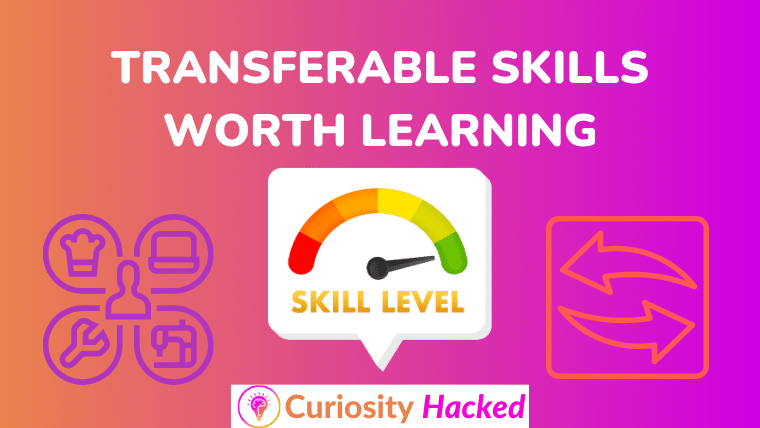Are you ready to unlock your future? In today’s rapidly changing world, transferable skills worth learning have become the key to unlocking new opportunities and achieving professional growth.
With the right set of these transferable hard and soft skills together, you can adapt to various roles and industries, making you an invaluable asset on the job market.
This blog post will guide you through the most important transferable skills worth learning, how to develop them, and how to showcase them effectively for career success. Let’s embark on this journey together and unlock your future!
Short Summary
- Unlock your future: hone essential transferable skills to stay ahead in the job market.
- Master communication, emotional intelligence, technical, and time management skills for success.
- Showcase your transferable skill set and unlock the potential for a successful career change!
The Value of Transferable Skills

Transferable skills are like superpowers that you can bring to any job, regardless of your industry or role. They are the abilities that make you stand out from the crowd, enabling you to excel in various roles and industries. These skills are also crucial when considering a career change, as they demonstrate to employers that you possess the necessary capabilities to thrive in a new role.
Some examples of transferable skills include communication, critical thinking, management, and leadership skills. Developing these portable skills makes you more employable and attractive to potential employers, opening doors to new opportunities and career paths.
So, whether you are a project manager, a corporate trainer, or a computer whiz, having a strong set of transferable skills is incredibly valuable for your professional growth.
Essential Transferable Skills to Learn

To stay ahead in the competitive job market, developing a repertoire of transferable skills that can give you an edge is essential. Some of the most important transferable skills to learn include communication, emotional intelligence, demonstrate leadership, technical skills, time management, adaptability, creativity, networking, conflict resolution, and research and analytical skills.
By mastering these skills, you can better navigate the ever-evolving landscape of modern business and boost your career prospects.
1. Communication Skills
Effective communication is the lifeblood of any successful professional. Strong communication skills enable you to collaborate with colleagues, customers, and other stakeholders, ensuring smooth operations and a positive work environment. As a good communicator, you can convey your ideas and opinions clearly and persuasively, making it easier to achieve your goals and contribute to your team’s success.
In addition to being a great speaker, it’s equally important to be a great listener. Active listening skills allow you to understand the needs and concerns of others, fostering stronger relationships and promoting teamwork. You become an invaluable asset to any organization by honing your communication skills.
2. Emotional Intelligence

Emotional intelligence (EQ) is the ability to recognize, understand, and manage your own emotions and those of others. In today’s interconnected world, EQ is more important than ever, as it enables you to build better relationships with your colleagues and clients and navigate complex workplace dynamics.
Developing empathy is a key aspect of emotional intelligence. Empathy is soft skill that allows you to relate, listen, and demonstrate understanding and compassion towards others. By honing your EQ skills, you become a more effective leader and team player, fostering a positive and supportive work environment for everyone involved.
3. Technical Skills
Technical skills are the tools that help you work more efficiently, build your confidence in tech skills, and become more competitive in the job market. Whether it’s coding, data analysis, machine learning, artificial intelligence, cybersecurity, or cloud computing, having a strong technical skill set can increase your productivity and give you an edge over the competition.
Project management skills using technology is another invaluable transferable skill, as it enables you to manage projects to a successful conclusion. By developing your technical skills and staying updated on the latest industry trends, you can ensure that you are always prepared for the challenges of the modern workplace.
4. Time Management
Time management is the art of organizing and prioritizing tasks to make the most out of your day. By mastering time management skills, you can reduce stress, boost productivity, and achieve your goals in a timely manner.
To develop effective time management skills, setting clear goals, creating a plan, and breaking tasks down into smaller, manageable pieces are essential. Prioritization and setting deadlines are also crucial for staying on track and ensuring that you are focusing on the tasks that matter most. With strong time management skills, you can take control of your schedule and make every minute count.
5. Adaptability
In today’s fast-paced world, adaptability is a must-have skill. Being adaptable means effectively adjusting to changing situations and embracing new challenges with a positive attitude.
Adaptability is also crucial for organizations as they face constant change and need teams that can quickly respond to new challenges. By cultivating your adaptability skills, you become an invaluable asset to any organization, ready to tackle new challenges and contribute to the company’s success in an ever-changing landscape.
6. Creativity
Creativity is not just about having ideas – it’s about bringing those ideas to life and turning them into tangible outcomes. Creative problem-solving is a highly valuable transferable skill that allows you to approach projects from a new perspective, think outside the box, and provide innovative solutions to challenges.
By embracing your creative abilities, you empower yourself to tackle complex problems and contribute to the success of your team and organization. Creativity is an essential skill for professionals in any field, as it drives innovation and helps pave the way for progress.
7. Networking
Networking, or connecting with like-minded professionals, can be an incredibly powerful tool for identifying and developing transferable skills. By engaging in conversations with others, you can gain insights into your own abilities and discover new opportunities for growth.
Moreover, networking can help you make your resume and LinkedIn profile stand out by ensuring you understand your target industry’s language and effectively demonstrate your knowledge and skills. By cultivating a strong professional network, you can open doors to new opportunities and accelerate your career growth.
8. Conflict Resolution
Conflict is inevitable in any workplace, but resolving conflicts effectively is a highly valuable transferable skill. Conflict resolution involves understanding the root cause of a disagreement, working together to find a mutually beneficial solution, and taking the necessary steps to implement it.
By developing your conflict resolution skills, you can improve workplace relationships, foster a collaborative environment, and contribute to the overall success of your team and organization. Moreover, effective conflict resolution can help you become a more effective leader, as it demonstrates your ability to navigate complex situations and bring people together.
9. Research and Analytical Skills
Research and analytical skills are essential for making informed decisions and solving problems in today’s data-driven world. Developing these skills allows you to break down complex problems, identify patterns, and devise effective solutions.
These skills are not limited to specific industries, as data analysis and problem-solving abilities are highly sought-after in various fields, from the rental car industry to big tech to Wall Street and government. By honing your research and analytical problem-solving skills, you can maximize your potential and tackle even the most challenging problems with confidence and ease.
How to Develop Transferable Skills

Developing transferable skills requires dedication, practice, and a commitment to continuous learning. You can expand your skillset and become a more versatile professional by taking courses, attending workshops, training, and reading books.
It’s also essential to be proactive in seeking out opportunities to apply and refine your transferable skills. This could involve volunteering for projects or leadership roles, participating in industry events, or engaging in networking activities. By actively working on your transferable soft skills now, you can unlock your potential and pave the way for a fulfilling and successful career.
Showcasing Your Transferable Skills

Showcasing your transferable skills on your resume, cover letter, and during interviews is crucial for making a strong impression on potential employers. You can demonstrate your ability to excel in your target role by effectively highlighting your skills, even if you lack industry-specific experience.
To showcase your transferable skills effectively, be sure to provide specific examples of how you have applied these skills in the past and the positive outcomes that resulted from your efforts. This could involve highlighting successful projects, initiatives, or leadership roles demonstrating your transferable skills. By making your transferable skills important, tangible, and relevant, you can increase your chances of getting hired and set yourself up for professional success.
The Role of Transferable Skills in Career Change

Transferable skills are invaluable when changing careers, as they demonstrate to employers that you have the necessary skills to succeed in a new role. By showcasing your transferable skills, you can overcome the challenges of a career change and convince potential employers that you are a strong candidate, even if you lack direct experience in your target industry.
To leverage your transferable skills in a career change, it’s essential to tailor your resume and cover letter to highlight the skills and experiences that are most relevant to your target role. By emphasizing your transferable skills and showcasing your ability to adapt and excel in new challenges, you can open doors to new career opportunities and embark on an exciting new chapter in your professional journey.
Summary
In conclusion, transferable skills are the key to unlocking your future and achieving professional growth. By developing many transferable skills, such as communication, emotional intelligence, technical skills, time management, adaptability, creativity, networking, conflict resolution, and research and analytical skills, you can become an invaluable asset in the job market and pave the way for a successful career.
As you embark on your journey to develop and showcase your transferable skills, remember that the road ahead may be challenging, but the rewards are well worth the effort. Dedication, practice, and a commitment to continuous learning can unlock your potential and achieve professional success, regardless of your career path.
Frequently Asked Questions
What are the top 3 transferable job skills?
Transferable job skills are essential for success in the modern workplace. Top transferable skills employers are looking for include good communication skills, problem-solving, and self-management. These essential abilities demonstrate that you can work well with others, think critically, and remain organized and productive.
You can be an asset to any team or organization with these qualities.
Why are transferable skills valuable?
Transferable skills are valuable because they demonstrate that you are capable and flexible enough to succeed in a variety of roles. Having transferable skills shows employers that you can quickly learn new skills, think critically, solve problems, and adapt to new situations.
In today’s ever-changing job market, these qualities are highly sought after.
Where are transferable skills useful?
Transferable skills are extremely valuable and useful in any field. They allow for increased flexibility, broader skill sets, and the ability to tackle a variety of tasks in both current jobs and future employment opportunities. With the right combination of transferable skills, job seekers can open doors to exciting and fulfilling career paths.





